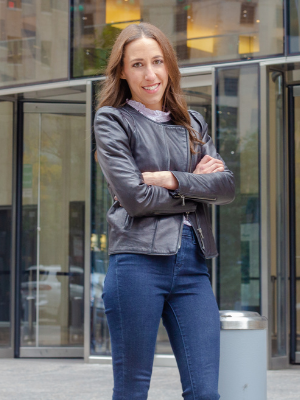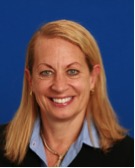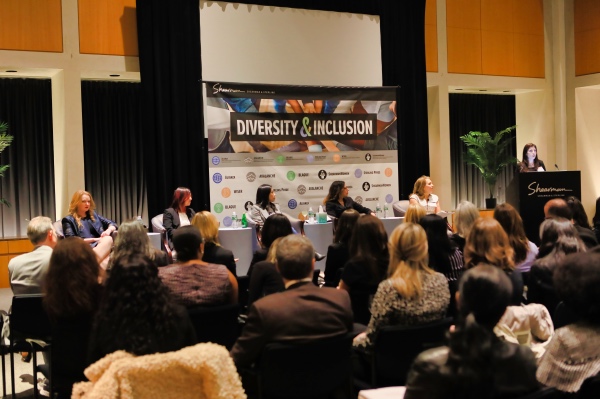 “It’s essential to create the space for people to be heard, especially when some aren’t as comfortable voicing their opinions,” says Stephanie Schultz. “I don’t want to be in a meeting and have everybody agree with a particular direction or discussion. I want to hear the people who are dissenting, or might have a different perspective, because it’s a pressure test – it’s helping to make sure that we’re getting to the most thoughtful outcome.”
“It’s essential to create the space for people to be heard, especially when some aren’t as comfortable voicing their opinions,” says Stephanie Schultz. “I don’t want to be in a meeting and have everybody agree with a particular direction or discussion. I want to hear the people who are dissenting, or might have a different perspective, because it’s a pressure test – it’s helping to make sure that we’re getting to the most thoughtful outcome.”
Schultz talks looking ahead of yourself in the job hunt, going for the win-win in strategic partnerships, working in a get-it-right fintech culture and the merits of adaptive leadership.
“It’s About The Next, Next Job”
Having no clear idea of what exactly she wanted to do after college other than live in NYC, Schultz graduated with an economics and business degree from Lafayette College – feeling she’d have the breadth to explore her options while getting her feet wet.
But in 2009, she inherited a tough job market in which few of her peers were landing any positions. It was tempting to take the first offer that came – an executive assistant role at a small audio-visual music company – until a previous internship manager questioned whether it was the direction she truly wanted to go.
“She was the one who really encouraged me that whenever I was to think about a job, it’s not about that job. It’s about the next, next job,” reflects Schultz. “That was so important, because in the moment, I had not thought that way – and it was hard to turn down a job at a time when no one was getting them, but I did.”
Schultz kept applying, including at American Express. She did not get the first role she applied for, but the hiring leader recommended her for another better-suited opening, which she then landed.
“I didn’t plan to be working in fintech or at a financial services company, but I was attracted to the brand and the values of the company,” says Schultz. “So thinking about the next, next job, I realized I could spend a long time at Amex, learn a bunch of different things and really launch my career.”
Twelve years on, she’s moved from product development to heading up partnerships for Amex Digital Labs, the innovation hub working to make Amex a leader in fintech. Her team is focusing on developing the next generation of products, customer benefits and membership experiences across the evolving digital landscape through partnerships with both major tech companies and start-ups.
The Strategy of Win-Win Partnership in Fintech
“There is so much disruption happening in payments, which has really excited me and kept me passionate about the work itself,” says Schultz. “The technology is continuously evolving and so are customer needs. Payments are so foundational to everyday life, so it’s exciting to keep learning, to be on the cutting edge of improving and innovating, and to make a tangible impact in something that people do every single day.”
A recent product Schultz introduced, called Send & Split, was created in partnership with PayPal and Venmo, synonymous with peer-to-peer payments. Rather than create their own platform, the Amex Digital Labs team worked with PayPal and Venmo to develop a unique digital integration within the Amex mobile app to create a better customer experience – enabling Card Members to send money to friends and family without the standard Venmo or Paypal credit card fee. Her team also developed value-added features like enabling the splitting of transactions, such as an AirBNB stay or dinner, making it seamless to share bills and ease the social interactions between users.
Not only does she have a reputation for getting stuff done, but also for being able to navigate the tougher territories of strategic partnership. She feels if you come from a receptive solution space, there is often a win-win meeting ground to be found amidst conflict.
“I feel that throughout the years at Amex, I’ve been the person at the helm of some of the more complex questions or unique products,” reflects Schultz. “When a lot of people are saying it just can’t be done, that is the point at which they bring me in to help lead and figure it out.”
Her approach is not to force or strong-arm an outcome but rather – in the context of long-standing relationships across multiple lines of Amex business, complicated initiatives, and unchartered territories – to seek and find a workable and lasting solution for all involved.
“Building relationships is core to what I do, and it’s about thinking of the bigger picture and setting those partnerships up for success,” reflects Schultz. “I used to enter a negotiation feeling as though it’s my side versus your side. Throughout the years, I’ve completely shifted my perspective: it’s not me versus you. We’re in this together, and we want this to be a lasting partnership. So how do I find what really works for both of us? It’s about being real and authentic and transparent with your objectives, and what you’re both trying to achieve, and how you can get there most effectively, together.”
An Integrated Culture of Doing it Right
One of the hardest moments at work was the day Schultz told her boss she was pregnant, because she realized she was anxious about moving towards a time of managing multiple priorities, with family first, and how big of a change it would personally be for her.
“That was a difficult moment to navigate and come to that realization, but now has been the greatest gift of all,” says Schultz. “Becoming a mom has helped me to be more efficient and effective at prioritizing my time and has been a net positive thing on who I am as an all-around human being and empathetic leader.”
Fintech is not at all a “move fast and break things” culture as you might expect, because with working with heavy regulations and major tech companies, the work culture is far more focused on doing it right than just doing it fast.
“The culture at American Express has been something that has kept me in this role. It’s a culture that welcomes the diversity of perspectives and ideas and makes the space for that,” she observes. “You would think the culture might have multiple layers of hierarchy and you have to navigate that, but that has not been my experience. The expert is in the room while the presentation is happening.”
Former Amex Vice Chairman Ed Gillian, whom Schultz was inspired by, was often on the ground floor around projects that were driving digital transformation, working beside managers and analysts.
Digital Labs also has creative ways of cultivating inspiration, as ideas come from any direction. Regularly, her team has inspiration calls where they can share anything, from an article to a new app feature, that may be inspiring them. When it comes to ideas from the ground up, the team has a forum and toolkit to equip anyone with the spark of inspiration to be able to go from idea stage to concept and then to action, while also having access to the investment and resources to get the project off the ground.
Being Adaptive in Leadership
The one thing she most wishes to impart on her mentees is the power of belief and the feeling of being championed, pointing out how teacher Rita Pierson inspired a classroom of struggling students in an underprivileged community to succeed by reframing the way they perceived themselves: “I think that sometimes people’s potential can be redefined based on what other people see in them. There were moments throughout my career when I didn’t necessarily see myself having that potential, but I had a mentor or a sponsor who saw that in me. Everybody deserves that.”
Within the Women’s Interest Network in Amex, Schultz is involved in the Ready To Lead program, mentoring and creating connections for aspiring leaders from other business units. She’s often found mentoring more like building a relationship, and particularly in her role, she often learns about new features and products from her mentees.
When it comes to being a leader, Schultz is thoroughly committed to supporting the unique working processes of each individual she manages, rather than imposing her own style of work.
“I have a more adaptive leadership style with my team. Some people might want me to roll my sleeves up and get in and white-board with them. Other people might prefer to take the challenge away and come back to me later with ideas,” says Schultz. “I personally feel I am there to set the charter for the team, to set the vision and the goals. I believe in a model of service to the people on my team. What works for you to be effective and then how do I flex my support based on what you need, to be a sounding board and roadblock remover and helpful guide along the way?”
While her style is more casual than the normal latitude of management approaches in financial services, being authentic in her own leadership has resonated and served her team and success.
Schultz spends as much time as she can with her toddler, Cooper. Since becoming a working mom, savasana has gone from the pose she could not stay still for to a treasured and glorious moment.
By Aimee Hansen


